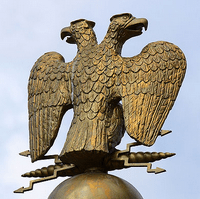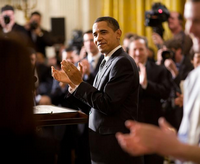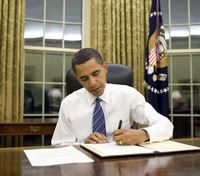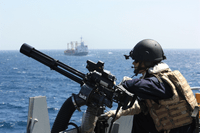A quote from a Le Monde article: Think of the context that arose in the region the day after . . . Everything had to be rebuilt, from roads to buildings, both public and private . . . XXXXX made its men, its building equipment, its businesses available. Thanks to its connections to corrupt political networks, it swept up the tenders and became the true partner for reconstruction. (Translated from the French.) So who could XXXXX be? Hezbollah, circa 2006, after the Lebanon War? Hamas, circa 2009, after the Gaza War? Nope. The Mafia, circa 1980, after the Naples earthquake. […]
Europe Archive
Free Newsletter
This makes sense to me, and seems like skillful diplomacy: The day after Turkey sends its foreign minister to Cyprus to maintain Turkish Cypriot commitment to reconciliation talks, Turkish President Abdullah Gul links a Turkish green light on the Nabucco pipeline project to Turkey’s EU accession negotiations, blocked by — among other things — the Cyprus standoff. Interesting how when it’s the EU or the U.S. doing this sort of thing it’s called “carrot and stick diplomacy,” but when it’s Turkey, it’s called “linking” and “conditionality.”
A big part of the American exit strategy from both Iraq and Afghanistan, and indeed a big part of U.S. COIN doctrine more generally, is the de-Americanization of the conflicts through the progressive replacement of U.S. forces by indigenous security forces. The same thing can essentially be said about efforts to get Pakistan to address the Taliban insurgency in FATA and the NWFP more aggressively as well. Those efforts will obviously hit snags, as this NY Times article about the lapses in Iraqi security forces’ preparedness illustrates. There’s also something predictably counterproductive about having the Pakistani military commit the same […]

Have we really reached the end of American hegemony? For those who think so, the signs of America’s decline and the rise of emerging powers are everywhere. According to this line of argument, the world’s sole superpower succumbed to overstretch. U.S. failures in the “war on terror” revealed the limitations of American military power, while its role in provoking the global economic crisis revealed the shortcomings of American economic leadership. As a result, rising powers around the world feel suddenly emboldened by America’s visible weakness. Brazil’s president blames the worldwide recession on “white-skinned people with blue eyes,” and Russia and […]
One of the elements undermining Turkish credibility in its claims to a regional role of mediator, of course, is the fact that Turkey itself is mired in longstanding disputes, one with Armenia and the other with Greece over Cyprus. Some headway was recently made on the Armenia front, even if thorny obstacles remain (Yigal Schleifer’s got more on that here). But the Cyprus standoff has far more practical and strategic consequences in terms of NATO-EU relations. So I’m not surprised to see newly named Turkish Foreign Minister Ahmet Davutoglu show up in Cyprus yesterday, probably to both show support and […]
Good news for the Lisbon Treaty. With the passage by the Czech Republic’s Senate, the only non-formality standing in the way of adoption is the do-over of the Irish referendum. Assuming it does ultimately pass, it will be fascinating to see how the first permanent EU president shapes the Union’s global profile. The treaty will provide the institutional structure, but a lot will depend on the personalities that end up incarnating the functions and the precedents they set. Less good news is this item about Italy returning a boatful of illegal immigrants directly to Libya, pursuant to a bilateral agreement […]

President Barack Obama didn’t look into Dimitry Medvedev’s eyes and claim that he saw the Russian president’s soul at the G-20 summit in early April. But the meeting between the two leaders has potentially set the stage for a more pragmatic relationship between Washington and Moscow. Substantial policy differences still separate the two powers, but the dynamics of the U.S.-Russia relationship have shifted away from the mutual bitterness that arose out of the August 2008 war in the Caucasus. However, although energy is not a major part of the public discourse on U.S.-Russian relations, it is a latent factor that […]

For years, analysts have argued that the Nabucco natural gas pipeline — a U.S.-backed effort to transport gas from the Caspian Sea to Europe via Turkey, thus bypassing Russia — needed to accept gas from Iran if it was to be economically viable. But Iranian involvement in the project, which is intended to reduce European energy dependence on Russian gas exports, has been anathema for U.S. policymakers: Washington’s efforts to thwart Iran’s ambitions have so far overridden its desire to thwart Russia’s. That may be changing. The White House has appointed a new envoy for Eurasian Energy, Richard Morningstar, who […]

Throughout its history, America has experienced many kinds of bubbles. The 19th century brought us a railroad bubble, the 20th, an Internet bubble. Now, 100 days into a new presidency, America has replaced the housing bubble that opened the 21st century with an Obama bubble. But while bubbles usually convey negative connotations, the “Obama Bubble” is one that we in America — and the rest of the world — desperately need. When George W. Bush came into office, the United States was still perceived by most countries as an ascendant nation — one reviving the infrastructure of its post-World War […]

No president could restructure U.S. national security strategy in 100 days. It is possible to announce new strategic concepts and goals, and to make some time-urgent changes. In practice, however, it takes months to translate strategic concepts into detailed plans and budgets, and even the most urgent actions take time to implement. A major restructuring of U.S. procurement or military end strength can take several years to implement, and the same is true of any major reorganization of a key department and the interagency process. Changing America’s Image That said, having inherited one of the worst presidential legacies of the […]
President Barack Obama entered office with such an inflated cloud of expectations hanging over his head that it is not surprising that some are criticizing him now for his “failures.” After a mere 100 or so days in office, why hasn’t he solved the global financial crisis, reversed global warming and brought peace to the Middle East? On the other hand, some of his partisans are wont to claim major foreign policy successes for the new administration because of the president’s personal popularity and the tumultuous acclaim he has received during his overseas visits. Yet during his first few months […]
I’ve been following recent developments in French-American relations with some concern, because after having correctly calculated that political advantage was to be had in “befriending” the toxic, late-term Bush administration, it increasingly seems like President Nicolas Sarkozy has decided the opposite is true with regards to the wildly popular, young Obama administration. So far, there are only behind-the-scenes whisperings to signal that France has once again passed into the “opposition,” in particular some post-London G-20 spin debunking the “Obama as savior” line pushed by the White House press team. But if Sarkozy’s “alignment” with Bush had everything to do with […]
I’m not sure exactly what went down at the side meeting between French President Nicolas Sarkozy and Chinese President Hu Jintao at the London G-20 summit. But it seems like it must have been one wildly successful pow wow. Last week, the two countries signed a string of — yup, you guessed it — nuclear deals. This past week, former President Jacques Chirac — a noted sinophile who once corrected a Chinese museum curator about the details of an antique vase on display — visited Beijing, and was greeted with a Chinese call to “boost the China-France comprehensive strategic partnership.” […]

MOSCOW — The Russian government has stepped up its efforts to keep social unrest in check as the financial crisis rages on across the country. Russia’s economy has been among the hardest hit globally, with the unemployment rate reaching the 10 percent threshold in March, its highest rate in the last nine years. Both government officials and critics in Russia and abroad have expressed public doubts about the economy’s ability to bounce back in such an adverse economic climate. The International Monetary Fund forecasts a 6 percent contraction in 2009. With the confidence of the oil-boom years a casualty of […]

With many of the world’s navies engaged in anti-pirate patrols off the coastal waters of Somalia, it’s no surprise to find French, German and Spanish frigates among them. The frigates are there, though, not under their respective national commands, but rather under that of a joint EU naval force, whose mission is to protect World Food Program vessels delivering food aid to Somalia, as well as commercial and other vessels threatened by pirates in the Gulf of Aden. While EU NAVFOR Somalia is the EU’s first maritime operation, it is not its first military operation, whether in Africa or beyond. […]
